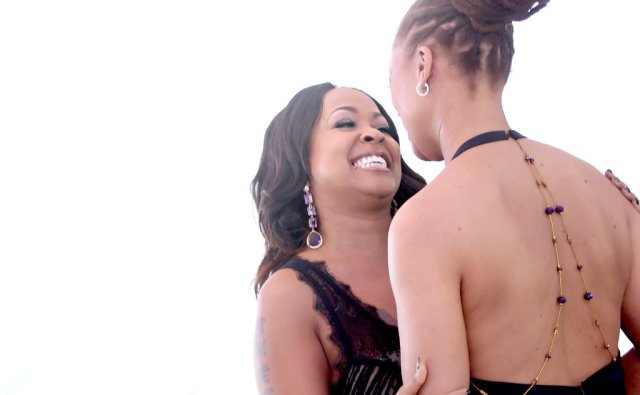feature image credit to Frank Amodo Photography
On the June 25th season finale of TvOne’s “R&B Divas” star Monifah Carter completed a journey that viewers had joined her in since the 2012 pilot episode: she married her girlfriend Terez Mychelle.

For those of us who had been following her career since her first hit, “Touch It,” we were excited to see her joining the talented cast of this show. Having not been out on the music scene in so long, joining the show was certainly a move to get the public used to seeing her and hearing her music again. I’m sure that her publicity and management team had a very specific strategy in mind for bring her back to the masses. And usually coming out is not a part of ANY African-American celebrity’s image consulting package. But that was exactly what Monifah did. She took a chance on exposing herself to the criticism at a time that she was also building her career. The role of the African-American celebrity is a very sensitive one; you’re expected to exude the traditional monolithic views of the black community. Most times when someone goes outside of that they face extreme ridicule from everyone from bloggers to hairstylists and pastors. That’s how far reaching the image of the black celebrity is. To take on that image with the grace and determination that Monifah did WILLINGLY, without being outed by some overzealous tabloid report, was nothing short of inspirational.
When she came out and introduced viewers to her partner, Terez, we were excited and shocked. Not shocked because she had a girlfriend, but shocked because we had never seen a black celebrity open up about their same-sex relationship. It was like we took a collective breath to see how far the storyline would go and how our community would be portrayed.
Because quite honestly? Network television doesn’t have the greatest track record when it comes to portraying the relationships of queer people of color. ESPECIALLY African-American people. Most portray us as closet cases or predators (The Haves and the Have Nots) flamboyant gossiping best girlfriends (Real Housewives of Atlanta, Fashion Queens) or dope dealing gangsters (OZ.) You will notice that none of those examples involved lesbians at all. Black lesbians are invisible figures in the queer community. We aren’t portrayed as cute like white males, sexy like white women, or fetishized like black men. To most we simply do not exist.

Arguably the best part of Monifah’s story is its authenticity. It was never about fabricating content or drama for the show but about showing the strong love between her and her wife. So much of her story was exactly like ours which allowed the show to address a few of the unique problems that QPOC folks take on when coming out. Her daughter objected to her relationship or “lifestyle” for religious reasons. Monifah address the pain while allowing her daughter to feel hurt and still loved. For those of us that were raised in the black church this addressed many of our issues with very religious family. Since most music industry folks go to great lengths to hide same-gender loving artists, it was great to have the opportunity to see how industry insiders on the show reacted to the relationship between Monifah and Terez. Their overwhelming support showed that people were not as unwilling to accept a season finale in which Monifah Carter had a same-sex relationship as many think. The stereotype of the homophobic R&B community was breaking down before our eyes.
For many in the queer community Monifah’s nuptials will fly under the radar. There won’t be any appearances on Ellen or huge layouts in magazines like The Advocate or Out Magazine. But the blessing is in the places that it HAS appeared. For a celebrity lesbian couple to grace the pages of legendary African-American magazines like Essence is a major milestone. It marks a shift in the way that our community displays QWOC and gives our straight mothers, sister and aunts an opportunity to share in this experience in a venue that was familiar and showed that it is not to far from their own lives. I’m never a fan of attempting to make mine or anyone else’s queer experience look heteronormative just to be accepted in mainstream culture. But I believe that sometimes allowing others to see our similarities shows our family and friends that QPOC are all around not different from you. It helps change the view from “those people” to “our people.” When you talk about loving the family, we ARE the family. Celebrities like Monifah, Michael Sam and Jason Campbell show that coming out doesn’t doom your career and it does not immediately disconnect you from the African-American community. There is a whole black queer community that has been waiting for someone to represent us in the media. We are ready to see our faces and hear our names. We are happy to have the opportunity to support positive representation of people who have experiences similar to ours. The media is ready to support our process and give us greater access to supporting each other. And I have just one thing to say to that.
It’s about time.







